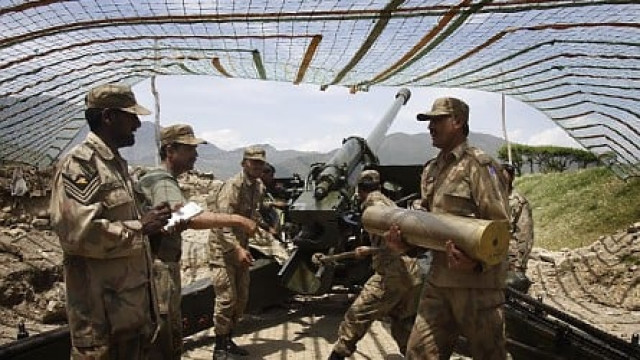Experts to S Asian govts: Spend more on people than on securing borders
Experts urge regional governments to draft people-centric foreign policies.

Spend more on people than on securing borders. PHOTO: FILE
Politicians, economists and civil society representatives at a conference here on Tuesday called for people-centred foreign and economic policies that could help resolve regional conflicts and fight poverty, diseases and injustices.
This was the crux of speeches made by delegates at the conference on “Democratization of Public Policies” where participants urged regional players to empower their citizens by engaging them in dialogues that address factors affecting South Asia’s security.
There is sufficient ground to adopt consultative process focused on responsiveness, governance, social services and pro-people foreign policy to address internal and regional conflicts and work towards closer cooperation among South Asian states.

“Instead of spending billions on safeguarding borders, South Asian states should focus on human security and diplomacy and framing policies that could defuse tensions and strengthen relations with neighbours,” they exhorted.
Economist Dr Pervez Tahir said major chunk of the national budget is allocated for defence which raises a question over the state’s spending on human security.
According to him, before devolution and 7th National Finance Commission award, all provincial governments would spend over 60 per cent on human security whereas, the federal government set a little less than half of the total budget on this account.

“Conventional notion in Pakistan is commonly lumped under national security whereas the economic security is kept low. So, with persistent poverty and rising unemployment due to fiscal stagnation, the country fails to create monetary opportunities,” he added.
Senator Haji Adeel of the Awami National Party (ANP) stressed the need for unity to fight terrorism in the region as it is badly affecting economies and people. He also termed the use of nuclear weapons ‘un-Islamic’.
For states to focus more on human, economic, food, health, education, environment, personal and community security, the participants termed demilitarization the only solution. This, according to them, specifically applied to Pakistan.

“There will be no peace in Pakistan until there is peace in Afghanistan and India,” said Senator Rauf Lala from the Pakhtunkhwa Milli Awami Party (PkMAP) who criticized the country’s foreign policy for being war-centric towards neighbouring countries.
Afghan parliamentarian Shah Gul Rezai said policies should focus more on establishment of friendly relationship in the region.
“Peace and security in Afghanistan is linked with the peace and security in the rest of the region,” she added.
Member of India’s Lok Sabha Dr Shahid Siddiqui said in the perspective most of South Asian governments believe that democracy is merely holding elections. This false notion is evidently an outcome of the control that ruling elite have over politics.
“In India, democracy is being badly affected by mass corruption, weak judicial system and media with vested interests,” he said.
There is a need to influence politicians, opined Dr Sibghatullah Khan, Director of Independent Directorate of Local Governance, Afghanistan. This could turn their attention towards making better policies that would help democracy.
“People are dying of curable disease, children face malnutrition, and public schools lack amenities like electricity, clean drinking water, toilets and boundary walls. No one is talking about them because they concern the poor,” said poet and political analyst Harris Khalique who added that territorial security has been wrongly prioritised in the presence of issues that affect lives of innocent citizens.
Meanwhile, Executive Director of Pakistan Institute of Labour Education and Research Karamat Ali blamed the bureaucracy and security agencies for the current sorry state of affairs.
Published in The Express Tribune, October 30th, 2013.



















COMMENTS
Comments are moderated and generally will be posted if they are on-topic and not abusive.
For more information, please see our Comments FAQ